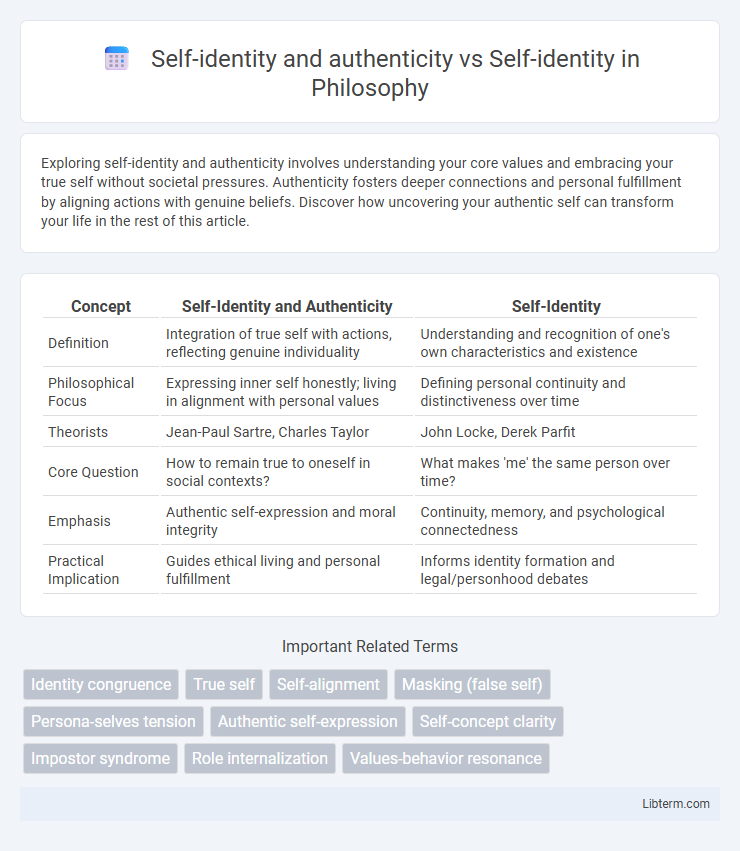Exploring self-identity and authenticity involves understanding your core values and embracing your true self without societal pressures. Authenticity fosters deeper connections and personal fulfillment by aligning actions with genuine beliefs. Discover how uncovering your authentic self can transform your life in the rest of this article.
Table of Comparison
| Concept | Self-Identity and Authenticity | Self-Identity |
|---|---|---|
| Definition | Integration of true self with actions, reflecting genuine individuality | Understanding and recognition of one's own characteristics and existence |
| Philosophical Focus | Expressing inner self honestly; living in alignment with personal values | Defining personal continuity and distinctiveness over time |
| Theorists | Jean-Paul Sartre, Charles Taylor | John Locke, Derek Parfit |
| Core Question | How to remain true to oneself in social contexts? | What makes 'me' the same person over time? |
| Emphasis | Authentic self-expression and moral integrity | Continuity, memory, and psychological connectedness |
| Practical Implication | Guides ethical living and personal fulfillment | Informs identity formation and legal/personhood debates |
Understanding Self-Identity: Foundations and Definitions
Self-identity encompasses the core understanding of who a person is, shaped by personal beliefs, values, and experiences. Authenticity involves aligning one's outward actions and expressions with this internal self-concept, ensuring congruence between identity and behavior. Foundations of self-identity include psychological constructs such as self-concept, self-esteem, and social identity, which collectively define an individual's distinct sense of self.
The Concept of Authenticity in Self-Identity
The concept of authenticity in self-identity emphasizes being true to one's inner values, beliefs, and experiences rather than conforming to external expectations. Authentic self-identity involves a coherent sense of self that aligns personal actions with genuine emotions and core principles. This alignment fosters psychological well-being and resilience by promoting a sense of integrity and personal fulfillment.
Key Differences: Self-Identity vs. Authentic Self-Identity
Self-identity refers to the overall sense of who a person believes they are, encompassing values, beliefs, and roles shaped by external influences and experiences. Authentic self-identity highlights the alignment between one's internal values and external behavior, emphasizing genuine self-expression free from social pressures or expectations. The key difference lies in self-identity's broad construct shaped by external factors, whereas authentic self-identity prioritizes congruence and truthful personal representation.
The Role of Social Influences on Self-Perception
Social influences play a crucial role in shaping self-identity by affecting how individuals perceive themselves through societal norms, cultural values, and peer feedback. Authenticity in self-identity emerges when individuals reconcile external expectations with their internal beliefs, promoting genuine self-expression amid social pressures. Understanding the impact of social comparisons and group dynamics helps explain variations in self-identity development and the pursuit of authenticity.
Navigating External Expectations and Personal Values
Self-identity and authenticity involve embracing one's true beliefs and values, resisting societal pressures that may distort personal integrity. Navigating external expectations requires balancing social roles with internal convictions to maintain a coherent sense of self. Prioritizing personal values fosters authentic self-expression, enabling resilience against conformity and preserving psychological well-being.
Authenticity as a Path to Self-Realization
Authenticity serves as a crucial path to self-realization by fostering congruence between one's internal values and external actions, thereby strengthening self-identity. Embracing authentic experiences enhances psychological well-being and promotes genuine personal growth. This alignment between true self-expression and identity cultivates resilience and a deeper understanding of one's purpose.
Challenges to Maintaining Authentic Self-Identity
Maintaining authentic self-identity faces challenges such as societal pressure to conform, internal conflicts between personal values and external expectations, and the impact of social media on self-perception. These obstacles often lead to identity fragmentation and emotional distress, hindering consistent self-expression. Navigating these challenges requires resilience and self-awareness to preserve genuine authenticity amid external influences.
Benefits of Embracing Authenticity in Self-Identity
Embracing authenticity in self-identity enhances psychological well-being by fostering genuine self-expression and reducing internal conflicts. Authentic self-identity promotes resilience, allowing individuals to navigate social pressures with confidence and maintain meaningful relationships. Research indicates that individuals who align their actions with their true values experience increased life satisfaction and personal fulfillment.
Practical Steps Toward Living Authentically
Self-identity and authenticity intertwine as individuals reflect core values and beliefs that define their true selves. Practical steps toward living authentically include consistent self-reflection, setting personal boundaries, and aligning daily actions with intrinsic values. Embracing vulnerability and honest communication strengthens genuine self-expression, fostering psychological well-being and self-acceptance.
Self-Identity and Authenticity: Implications for Personal Growth
Self-identity and authenticity are fundamental to personal growth, enabling individuals to align their actions with their core values and beliefs. Cultivating authenticity enhances self-awareness and fosters resilience, facilitating meaningful life decisions and deeper interpersonal connections. Embracing a coherent self-identity supports psychological well-being and promotes continuous self-development.
Self-identity and authenticity Infographic

 libterm.com
libterm.com